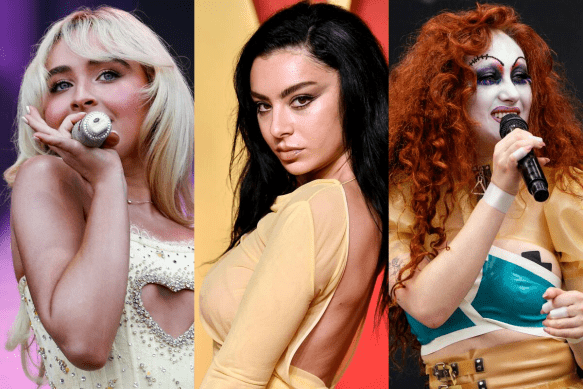
Pop Music’s New Wave: How Charli XCX, Chappell Roan, and Sabrina Carpenter Are Redefining the Genre with Authenticity and Vulnerability
Fiona Nanna, ForeMedia News
5 minutes read. Updated 4:53PM GMT Sat, 27July, 2024
Polished perfection has long ruled, a new wave of pop stars is making waves with their raw, unfiltered approach. Charli XCX’s latest album, Brat, epitomizes this shift, offering a refreshing break from the conventional.
Charli XCX’s Brat is more than just an album—it’s a cultural commentary reflecting the complexities and contradictions of modern womanhood. Charli’s lyrics, characterized by their vulnerability and existential musings, resonate deeply with millennials and Gen Z. Describing the album, Charli XCX portrays herself as a “girl who has a breakdown, but kind of like parties through it,” capturing the essence of being honest, blunt, and a bit volatile. The album has quickly become a mainstream phenomenon, embodying a blend of personal introspection and high-energy anthems.
This cultural shift is evident beyond the music. Charli’s tweet declaring “Kamala IS brat” and the rebranding of Kamala Harris’s X profile highlight how this “brat” archetype has permeated various aspects of pop culture. This phenomenon isn’t isolated to Charli alone. Artists like Chappell Roan and Sabrina Carpenter are also embracing this messy, candid persona, marking a departure from the traditionally polished pop star image.
Chappell Roan has carved out a niche with her unapologetically queer identity. Her vibrant drag queen outfits and sexually empowered lyrics distinguish her from her peers. Songs like “Pink Pony Club,” inspired by her experiences in a gay club, and “Good Luck, Babe,” which explores a tumultuous fling, showcase her unique voice. Jonah Graham, a 25-year-old fan, praises Chappell for her ability to create a space for listeners to connect through big emotions and irreverent humor.
Sabrina Carpenter, on the other hand, infuses her music with humor and self-indulgence. Her playful and often provocative lyrics, exemplified by her notorious ad-libbed outros, offer a stark contrast to the typically serious tone of mainstream pop. Culture critic Lucy Ford describes Carpenter’s approach as an embrace of fun and silliness, challenging the often overly serious nature of pop music.
Why the Shift?
The demand for more complex, authentic music seems particularly pronounced this summer. Content writer Olivia Cox notes that the appeal of these artists lies in their ability to “embrace silliness” and offer a break from the mundane. Rachel Humphreys, a 29-year-old Digital PR Manager from Pontefract, emphasizes that these artists represent a “cultural reset” and provide an escape from the pressures of adulthood.
This trend is not entirely new, however. CMAT, a Mercury Prize nominee, points out that women have always crafted stories with a blend of humor and tragedy. The modern wave, she argues, is a continuation of this tradition, with artists like Madonna, Lady Gaga, Lorde, and Billie Eilish laying the groundwork for today’s musical landscape.
As the pop world continues to evolve, these “bratty” pop stars will need to navigate the shifting sands of both the music industry and broader cultural trends. Their success will depend on their ability to stay ahead of the curve and resonate with audiences who are increasingly craving authenticity and depth in their pop music.

